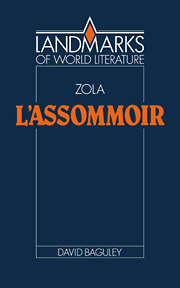2 - The ‘naturalist’ novel
Published online by Cambridge University Press: 05 June 2012
Summary
The family tree
Before going on to examine more directly the themes and techniques of L'Assommoir, we still need to relate the novel to Zola's naturalist aesthetics and to the second aspect of the scheme of the Rougon-Macquart series: the natural history of a family under the Second Empire. Without the class qualifier, Zola's definition of the subject of L'Assommoir in his preface to the novel, ‘the fatal decline of a working-class family’, could apply more generally to the whole of the Rougon-Macquart saga. The ‘fatal’ element is, as we have seen, largely sociohistorical, but it is also, more appropriately, biological, invested in the laws of heredity as Zola and many of his contemporaries understood them: a fatal, disruptive force. There are very few happy combinations of genes, or, in terms more appropriate to Zola's age, few happy mixings of traits and dispositions in the Rougon-Macquart. Zola was drawn as much to the dramatic possibilities offered by the laws of heredity as to their scientific validity. They also provided the novelist with a framework and a further unifying theme for his series.
The early plans for the series contain detailed notes on Zola's main scientific source: an imposing study by Dr Prosper Lucas, dating from 1847–50, his Traité de l'hérédité naturelle (Treatise on Natural Heredity), in its short title. Zola would later update his information with some more recent theories when, in 1892, he came to write the final volume of the series, Le Docteur Pascal (1893), where the whole history of the family is recapitulated.
- Type
- Chapter
- Information
- Emile Zola: L'Assommoir , pp. 33 - 53Publisher: Cambridge University PressPrint publication year: 1992



